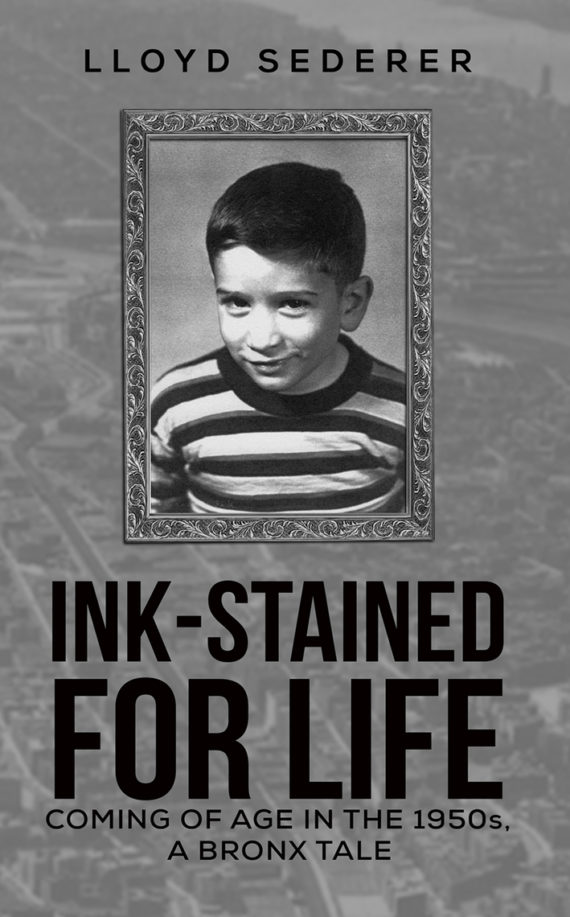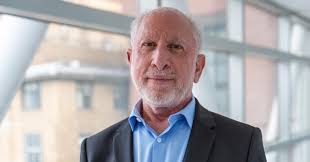
(10-4-20) Dr. Lloyd I. Sederer has had an incredible career.
He’s been the Medical Director of a Harvard teaching hospital (McLean Hospital), spent five years as Mental Health Commissioner in New York City, another twelve years as Chief Medical Officer of New York State’s mental health agency and seven years as Medical Editor for Mental Health with the HuffPost.
He’s also been busy as an author, writing nearly a dozen books, including The Family Guide To Mental Health Care, and more than 350 professional articles.
His newest offering, Ink-Stained For Life: Coming of Age in the 1950s, A Bronx Tale, has Sederer looking inward through a series of essays at his younger years and lessons that he’s learned.
“I had no plan to write a memoir, though the itch to write has been in me since my adolescence,” Dr. Sederer noted. The seeds for his new book were planted after the New York Times published an OP Ed in 2010 that Dr. Sederer had written about his chore of putting editions of Sunday newspapers out for sale at his father’s stationary shop when he was a child. “The Times had retitled it (bless them), Ink-Stained for Life, a far better title than I had provided…On the Saturday it was published, I went out early and bought a lot of copies of the paper. So, I had one memoir story and decided to write some more. Thirteen to be specific, twelve new ones and one adapted from a piece I had published in the HuffPost.” (Read original Times essay here.)
I’ve learned much from Dr. Sederer, enjoyed when we have spoken, and appreciate his years of helping individuals with mental illnesses and their families – so I asked him to write about his new book, which I have not yet read, for my blog. I was especially interested in lessons he learned as a psychiatrist. He replied that his career choice was improbable because he was “as neurotic as could be…” as a child.
An Improbable Life
By Lloyd I Sederer, MD author of Ink-Stained For Life: Coming of Age in the 1950s, A Bronx Tale
When I was five, my family had moved from the South Bronx to its northeast section, where Italians, Irish, and Jews lived in red-brick, mostly attached, modest three-decker, two-family homes, with tiny lawns in the back and single car driveways in the front. That was the 1950s, my coming of age—a time when my country also was coming of age. There was opportunity, not for everyone, since racial and class inequities prevailed as they do today. But it was there for many, if you worked hard to get it.
No one would imagine, especially me, that I would become a psychiatrist, and have some of the most remarkable jobs in my field.
I was as neurotic as could be, full of self-doubt, and shy.
I was no sports star either. There were no family members who modeled a profession, nor any athletes. Not an auspicious profile for the professional responsibilities and privileges I would later earn.
I have had a lot of jobs, including: being Medical Director for eleven years of McLean Hospital, a Harvard teaching hospital; as Director of Clinical Services at the American Psychiatric Association; as Mental Health Commissioner of NYC, in the first five years of Mike Bloomberg’s mayoralty; for twelve years as Chief Medical Office of the NYS Office of Mental Health (the largest state mental health agency in the country); and the founder/director of a University media center; among others.
How did that happen?
I had some really good teachers, who showed me that being smart and kind was a good thing. My parents expected me to be a good student, so I was always acquitting myself with evidence of excellence. My family had its share of tumult, but were intact and upwardly mobile. The rest was up to me.
I have been entirely publicly educated, start to finish, from elementary to medical school and psychiatric residency. But standardized exams, which I assure you I did not know I was taking (nor were there prep courses and tutors like today), placed me into accelerated programs. Leading to being invited (another surprise) to attend the renown Bronx High School of Science. Though, I must admit, it was at Science that I humbly discovered what really smart kids were like.
My public education continued at The City College of New York, virtually free and sometimes called the Harvard of public colleges. It was there I got hooked on both the brain and the mind – and going to medical school was the way to advance that passion. The specialty that would encompass that vast oeuvre was psychiatry. Count me in. I was accepted into a psychiatric residency at the State University of New York schools (in Syracuse).
But you may still wonder, how did this modest, uninspiring early life result in what many would regard as some of the most auspicious positions in my field?
One answer is what I say to young professionals when they ask for career advice: find the hardest job you can (but not impossible), then take it, master it, and then look for another job, the hardest (but not impossible) you can find, and take it, master it, and so on. That’s how you get really good at what you do, and stay that good. Which is what I did.
My first job (when drafted during the Vietnam War, and my draft board approved), was at a public mental health clinic, as the only psychiatrist in a large, rural, federally designated impoverished county. I had 10 inpatient beds in a small, community hospital and a monthly circuit in three clinic sites around the county. Mind you, I had barely gone beyond my internship. I think I learned more about my field in that job, and how to do quite a bit with very little, than perhaps any since them.
My service requirement fulfilled, I completed my residency. For one year after, I tried working in a highly esteemed community hospital in upstate New York (the Mary Imogene Bassett Hospital, affiliated with Columbia Medical School), but you can take a boy out of the city, but not the city out of a boy.
I saw a job posting in Boston, at the Massachusetts General Hospital, for the Associate Director of their 21-bed. inpatient, training, service. Having little idea what a prestigious place that was, I applied, and was interviewed. After I was offered (another surprise) and accepted the job, I discovered that the chief of service would very soon be leaving. Bait and switch? I was told I would “advance” to be the Director of the unit, with its training mélange of residents and psychology interns, and a gaggle of social work and nursing trainees. So, I took what later was the advice I now give to those who ask. I was in for a really hard and totally engaging job.
I then spent seven years in Cambridge, Massachusetts, taking care of patients, running different services at The Mount Auburn Hospital, and teaching at Cambridge Hospital. I finally also got the treatment my head needed in the form of six years of psychoanalysis, four times a week.
At the end of that period, I was ready, needed, to take on more. I told my chairmen that I would be leaving, not sure when or for what. By then, I realized I would never “plan” for my next position.
You know the joke, “If you want to make God laugh, tell him (her?) you have a plan.”
Then I got a call from Steven Mirin, MD, whom I knew from the Massachusetts Psychiatric Society. He had been recruited back to be Medical Director at McLean Hospital, after working in the private sector. But the legendary Sherv Frazier, MD, who had given him his new job, stepped down, unexpectedly and rather precipitously. Mirin would take on the mantle of Psychiatrist-in- Chief that Frazier had vacated. Steve wanted some help, he told me, with his now two jobs as well as bringing McLean into the 1990s. He invited me to lunch at his new corner office; we had tuna fish sandwiches on the glass table between the couches (regular, not analytic couches!). When we were done cleaning up, he said, “…want to work here…be the medical director I was to be?” I said yes, right away, again having little idea about the hospital or the hell we would go through for six years to save McLean. I guess I am consistent: no planning, and improbable.
My time done after eleven years at McLean, I re-joined Mirin, who had left to be the Medical Director of the American Psychiatric Association (APA). My two years in Washington focused on treatment quality, standards of care, and medical economics. Then Mirin announced he was leaving the APA, after his 5-year contract was over. It was up or out for me. I talked to a few people I knew saying I was available.
New York City had a new mayor, Michael Bloomberg. I was recruited to be the mental health commissioner in his administration. I must have met a batch of check-boxes: a diverse clinical background, my time in the Harvard system – including being medical director of its psychiatric hospital, author of books and articles, and experience in Washington and federal funding. I had no experience with government. Those five years hooked me on government, and led to my 12 years as Chief Medical Officer for the state’s mental health agency, a position that allowed for even more opportunities to improve, at scale, the public mental health of New York State.
Now in my 70s, I have entered the world of .coms – who would have guessed when I was a boy? They didn’t even exist! This new world and culture are further sources of oxygen for me, and as improbable as the job carcasses I left behind.
It’s been a good run, for the most part. Redolent with experiences, relationships, constant learning and climbing mountains. With an abundance of confusion, some hard-earned clarity, and ever-growing gratitude. Because I can’t get my head around it all, I’ll end with saying bon-voyage and bonne chance (good luck) to my fellow and future improbables.




